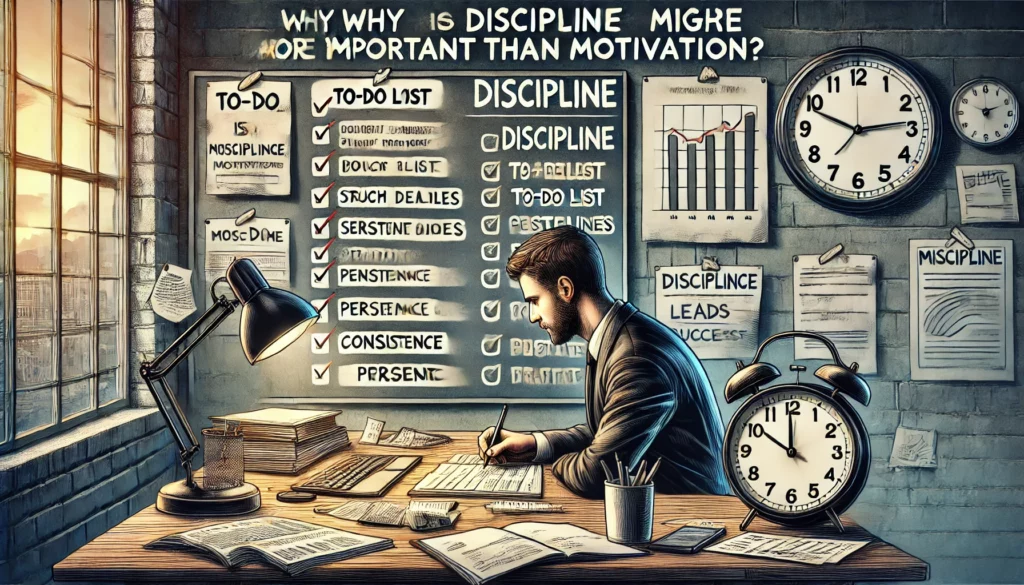Many people believe that motivation is the key to success. They wait for the right moment, the perfect inspiration, or an external push to take action. However, motivation is fleeting—it comes and goes. Discipline, on the other hand, is reliable and consistent. It ensures progress even when motivation is low.
This article explores the difference between motivation and discipline, why discipline is a stronger driver of success, and how you can develop it to achieve your long-term goals.
The Difference Between Motivation and Discipline
While both motivation and discipline play a role in success, they operate differently. Motivation is emotional and depends on internal or external inspiration. Discipline is a habit—something you do regardless of how you feel.
Motivation is emotion-driven, temporary, and inconsistent. It requires inspiration and can disappear when challenges arise. Discipline is habit-driven, long-term, and reliable. It functions without external triggers and keeps you on track even when things get difficult.
Think of motivation as a spark—it ignites action but burns out quickly. Discipline is the fuel that keeps the fire going long after motivation fades.
Why Motivation Alone Is Not Enough
Relying on motivation is like waiting for perfect weather to go outside—it’s unpredictable. Motivation fluctuates: some days you feel inspired, others you don’t. It fades when things get hard, and it depends on external factors—a motivational video might pump you up temporarily, but it doesn’t build consistency.
That’s why people often start new habits like exercising or waking up early, but give up after a few days. They had motivation to start, but not the discipline to continue.
How Discipline Leads to Long-Term Success
Discipline removes the need for constant inspiration. Instead of relying on how you feel, it turns actions into habits. This leads to consistency—you take action daily no matter what. It improves efficiency—you don’t waste time debating whether to do something. And it fosters growth—you build skills through repetition.
Let’s look at how discipline and motivation respond to real situations.
When you don’t feel like working out, motivation says, “I’ll skip today and do it tomorrow.” Discipline says, “I go to the gym no matter what.”
When you’re tired after work, motivation says, “I’ll start that project later.” Discipline says, “I do 30 minutes of focused work anyway.”
When you don’t feel inspired to write, motivation says, “I’ll wait for inspiration.” Discipline says, “I write 500 words daily, no matter what.”
When discipline takes over, your actions become automatic, and real progress follows.
How to Build Strong Discipline
Developing discipline isn’t about being naturally strong-willed—it’s about creating systems that make good habits easier and bad habits harder.
1. Create a Routine and Stick to It
One of the best ways to build discipline is by having a daily routine. When you do the same tasks at the same time every day, they become second nature.
Here’s an example of a simple discipline-building routine:
At 6:30 AM, wake up and exercise.
At 7:30 AM, plan your tasks for the day.
At 9:00 AM, do deep, focused work without distractions.
At 12:00 PM, take a break and have lunch.
At 2:00 PM, handle meetings or skill development.
At 6:00 PM, wind down and read.
By repeating a routine like this, your brain adapts, and actions become automatic.
2. Reduce Decision Fatigue
Too many decisions can drain your willpower. Simplifying your choices throughout the day helps preserve energy and supports discipline.
For example, instead of deciding what to wear each morning, rotate a few favorite outfits.
Instead of thinking about what to eat, meal prep on Sundays or choose a simple set of go-to meals.
Instead of debating when to exercise, do it at the same time daily.
Instead of checking email all day, set fixed time blocks to manage your inbox.
When fewer decisions are required, you’re more likely to stay on track.
3. Set Clear Goals with Deadlines
Discipline thrives when you have specific, actionable goals. Avoid vague statements like “get fit” or “be more productive.” Instead, set clear targets.
For example, say: “Exercise for 30 minutes every Monday, Wednesday, and Friday.”
Or: “Read 20 pages of a book every night before bed.”
Or: “Write 500 words per day for 30 days.”
These kinds of goals create structure and remove confusion, making discipline easier to maintain.
4. Use the “Do It Anyway” Mindset
Highly disciplined people act regardless of how they feel. They don’t wait for motivation—they rely on habit.
Not in the mood to work out? Go for 10 minutes—you’ll probably continue once you start.
Not feeling inspired to write? Write one paragraph—momentum will take over.
Too tired to study? Read for five minutes—any effort is better than none.
The “do it anyway” mindset is about showing up no matter what.
5. Track Progress and Stay Accountable
Progress fuels discipline. When you see how far you’ve come, you’re more motivated to stay consistent.
You can use a habit tracker to visually mark your daily wins.
Use a journal to reflect on what’s working and where you’re struggling.
Or check in with an accountability partner weekly to stay on track.
Tracking progress builds self-awareness and strengthens commitment.
6. Make Discipline Easier by Removing Temptations
Discipline becomes easier when bad habits are less convenient.
If social media is a distraction, use website blockers or put your phone in another room.
If unhealthy snacks are your weakness, don’t keep them at home.
If TV keeps you from reading at night, place a book on your pillow as a reminder.
Designing your environment for success reduces the need for willpower.
Final Thought: Discipline Creates Freedom
Many people think discipline is restrictive. In reality, it’s the opposite. Discipline gives you the freedom to focus, the power to follow through, and the confidence to trust yourself.
When you master discipline, you control your time instead of reacting to distractions.
You achieve your goals faster because you take action daily.
You build self-respect because you know you can rely on yourself—even when things get tough.
Motivation is great when it shows up, but it’s not dependable. Discipline is.
Start by creating simple routines. Reduce the number of decisions you make. Set clear goals. Remove temptations. Track your progress.
And most importantly—show up every day, especially when you don’t feel like it.
Because discipline, not motivation, is what transforms dreams into reality.
Gabriel Silva is the founder of Cursos e Soluções, a blog dedicated to personal growth, habit change, and self-discipline. Passionate about self-development and productivity, he shares practical, research-backed strategies to help people achieve their goals. He believes that small, consistent changes can lead to significant transformations over time and is committed to providing content that empowers both personal and professional success.







